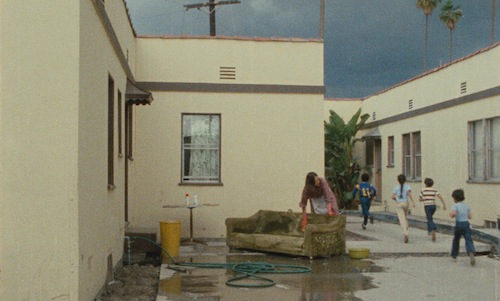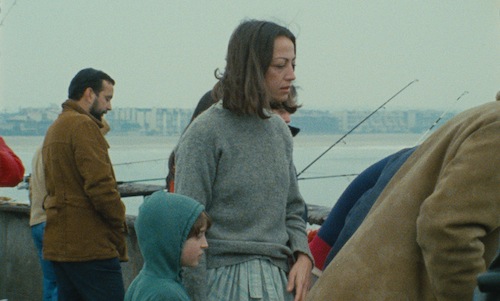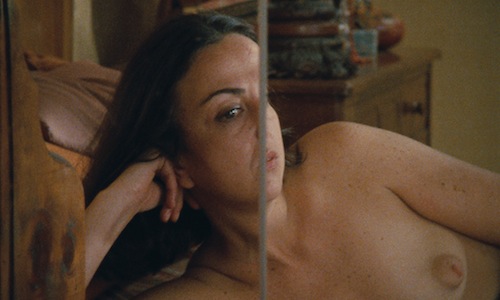Agnès Varda has cited Documenteur as her favourite of her own films, presumably because even more than The Beaches of Agnes (2008), it is her most personal and most emotional. She was apart from her husband Demy on her second trip to Los Angeles, at the start of the ‘80s, to develop a script (turned down), deciding instead to make her documentary Mur Murs (1981) on the city’s mural art. During this time she was inspired both by her sadness of separation and by the sense of disenchantment and exile she found in Venice, to make a film that fully justifies its subtitle of an “emotion picture.”
That emotion is pain. Emilie (Sabine Mamou, editor of both the LA films), is recently split from her husband, left looking for a home with her young son (played by Varda’s own, Mathieu Demy), typing a script for an absent filmmaker, and observing the slightly forlorn figures who fish off the Venice pier or glean the trash for who-knows-what, accompanied by bursts of Georges Delerue’s exquisitely melancholy solo piano pieces (performed by Michel Colombier).

The pain of separation is compounded by a sense of dislocation, as the frequent and lengthy voiceover revels in French words that are of little use to Emilie where she is, to the extent that they start to lose their meaning: a litany of lists, synonyms, and alliterative associations as though she is trying to keep the words and the language alive for herself. One of the first things she says (though it’s Varda’s voice) is that “faces are more real than words” and the film’s very title (menteur = liar) indicates the mixture of fiction and observation that Varda is after. The murals make an appearance – starting, appropriately enough, with the limit-of-the-world “Isle of California” (nowhere left to go) – and the film is as much a document of Venice in 1981 as it is anything else.
Yet even this observational viewpoint does not pretend objectivity. Varda has spoken of the sad air of the place, as far west as one can go in search of one’s dreams, and thus for those who do not find it, a sort of graveyard. So to capture this air of disenchantment she avoids the sunshine, instead choosing always the shady side of the street, filming the grey atmosphere of the marine layer, rain-slicked streets and overcast skies, avoiding the boulevards and the boardwalk in favour of narrow alleyways, a late-night laundromat, or the dismal grey concrete of the pier. Even Emilie’s view from her beachfront work desk feels more like a desolate boundary than a destination for pleasure-seekers.

The sad air that Varda is after, the palpable emotion, is undercut however, by a marked dislocation of the audio track, none of which appears to have been recorded direct, and none of which matches the movements of the mouths we see. Deliberate or not, the effect is off-putting, even alienating, in a way that is hard to ignore even for aficionados of, say, Welles’ independent films. It does at least add to the sense of Emilie’s dislocation and isolation, both from her surroundings and from her language, but for most will be an unwelcome distraction.
This sense of isolation is not complete, however, for Mathieu is her almost constant companion. Yet she must try to teach him to be alone also, repeatedly refusing his pleas to come and sleep in her bedroom (pointedly without reverse cuts to her half of the conversations) and when they are apart, it is he who looks inquisitively out of the window and around the neighbourhood, whilst she retreats into herself, contemplating her naked self before a mirror (in a sequence of sweet, sad serenity).

The film is not all doom and gloom, however. Mamou is an attractive presence who does not wallow in self-pity but is simply overwhelmed to the point of numbness – yet her bright eyes show that she has not been entirely beaten. And although the change of location is not signposted, the film ends on a note if not of optimism, then at least a moment of happiness, as we move inland to the bustling community of Olvera Street, with a mariachi band playing from the balcony. To Mathieu’s pleasure, when one is sad, at least one can always go outside and dance a polka.
AFI FEST festival film page: Documenteur
Credits:
Country: France, USA
Year: 1981
Director: Agnès Varda
Screenwriter: Agnès Varda
Producer: Cinè-Tamaris
Cinematographer: Nurith Aviv
Editors: Sabine Mamou, Bob Gould
Music: Georges Delerue
Cast: Sabine Mamou, Mathieu Demy, Lisa Blok, Tina Odom, Gary Feldman
